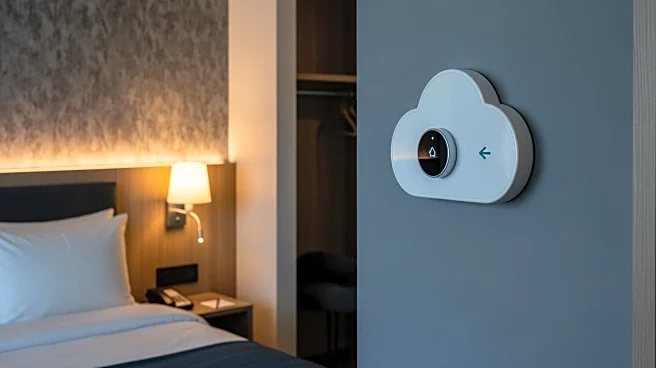What's Happening?
The hospitality industry is increasingly adopting cloud-based smart thermostats to improve energy management and guest comfort. Traditional smart thermostats, which operate on 'If This, Then That' logic,
are evolving to integrate with property management systems (PMS) for more efficient energy use. These devices, initially designed to monitor occupancy, now leverage cloud computing to enhance predictive capabilities and optimize operations. By moving complex calculations to the cloud, hotels can deploy simpler, less expensive devices that serve as endpoints, while the cloud handles the heavy computational tasks. This shift allows for real-time analysis and dynamic energy pricing adjustments, offering significant cost savings and improved guest experiences.
Why It's Important?
The transition to cloud-based smart thermostats represents a significant advancement in energy management within the hospitality sector. By utilizing cloud computing, hotels can achieve greater energy efficiency and cost savings, particularly in regions with dynamic energy pricing. This approach not only reduces operational costs but also enhances guest comfort by allowing for more precise temperature control based on real-time data. The ability to leverage machine learning and artificial intelligence for predictive analytics further positions hotels to optimize their energy use and improve overall sustainability. As the industry moves towards more connected and controllable systems, the reliance on cloud infrastructure becomes crucial for maintaining competitive advantage.
What's Next?
As cloud-native energy management systems become more prevalent, hotels are expected to continue investing in infrastructure that supports these technologies. The focus will likely shift towards enhancing network reliability and ensuring seamless integration with existing property management systems. Additionally, the industry may see increased collaboration with utility providers to maximize the benefits of dynamic energy pricing. The ongoing development of AI and machine learning algorithms will further refine predictive capabilities, enabling hotels to continuously improve their energy management strategies. Stakeholders, including hotel operators and technology providers, will need to address concerns related to network connectivity and data security to fully realize the potential of cloud-based solutions.
Beyond the Headlines
The adoption of cloud-based smart thermostats in the hospitality industry highlights broader trends in technology integration and sustainability. This shift not only impacts energy management but also reflects a growing emphasis on digital transformation and the use of data-driven solutions to enhance operational efficiency. The move towards cloud computing and AI-driven systems may also influence other sectors, encouraging similar advancements in energy management and sustainability practices. As hotels become more reliant on digital infrastructure, issues related to cybersecurity and data privacy will become increasingly important, necessitating robust measures to protect sensitive information.









